
Frank
J. Sulloway, Ph.D.
Choices
![]()
Darwin and Evolution
Freud,
Biologist of the Mind
![]()
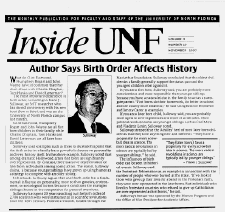
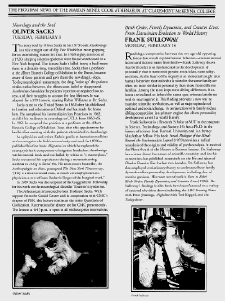
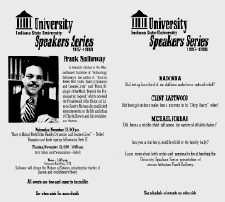
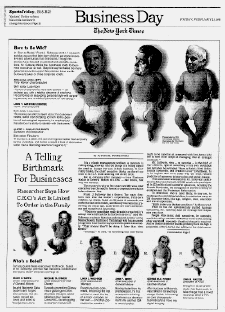

>Public Lectures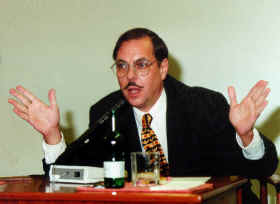
Dr. Sulloway has lectured widely throughout the United States and Europe, particularly on the life of Charles Darwin and on the subject of birth order and human behavior.
"In
Darwin's Footsteps: How the Galápagos Islands
Revolutionized His Thinking"
This lecture tells the untold story about Charles Darwin and his famous Galapagos visit, and how this visit set in motion one of the greatest revolutions in Western thought. The usual account found in biology textbooks is that Darwin arrived in the Galapagos Islands in September 1835 and, soon after seeing the remarkable animals and plants of this volcanic archipelago, was converted to the theory of evolution. This account is a myth and obscures a far more interesting story about the difficulty that even the most brilliant thinkers have in abandoning one way of understanding the world in favor of another.

Contrary to the legend, Darwin was initially confused by the famous Galapagos finches--he misidentified the so-called warbler finch as a warbler, and the cactus finch as a close relative of meadowlarks. Further, Darwin incorrectly believed the famous Galapagos tortoises had
been introduced by passing buccaneers. Not seeing them as native, he failed to procure any specimens. Later, on the way to Tahiti, Darwin participated with fellow Beagle crewmembers in eating the thirty adult tortoises that had been brought on board as a supply of fresh meat. The carapaces of these tortoises were all thrown overboard without Darwin ever examining them closely. In short, Darwin actually ate his data! Such mistakes, which today would be
considered naďve, provide clear evidence that Darwin was still thinking like a Creationist when he visited the Galapagos Islands.
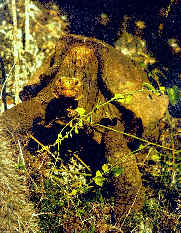
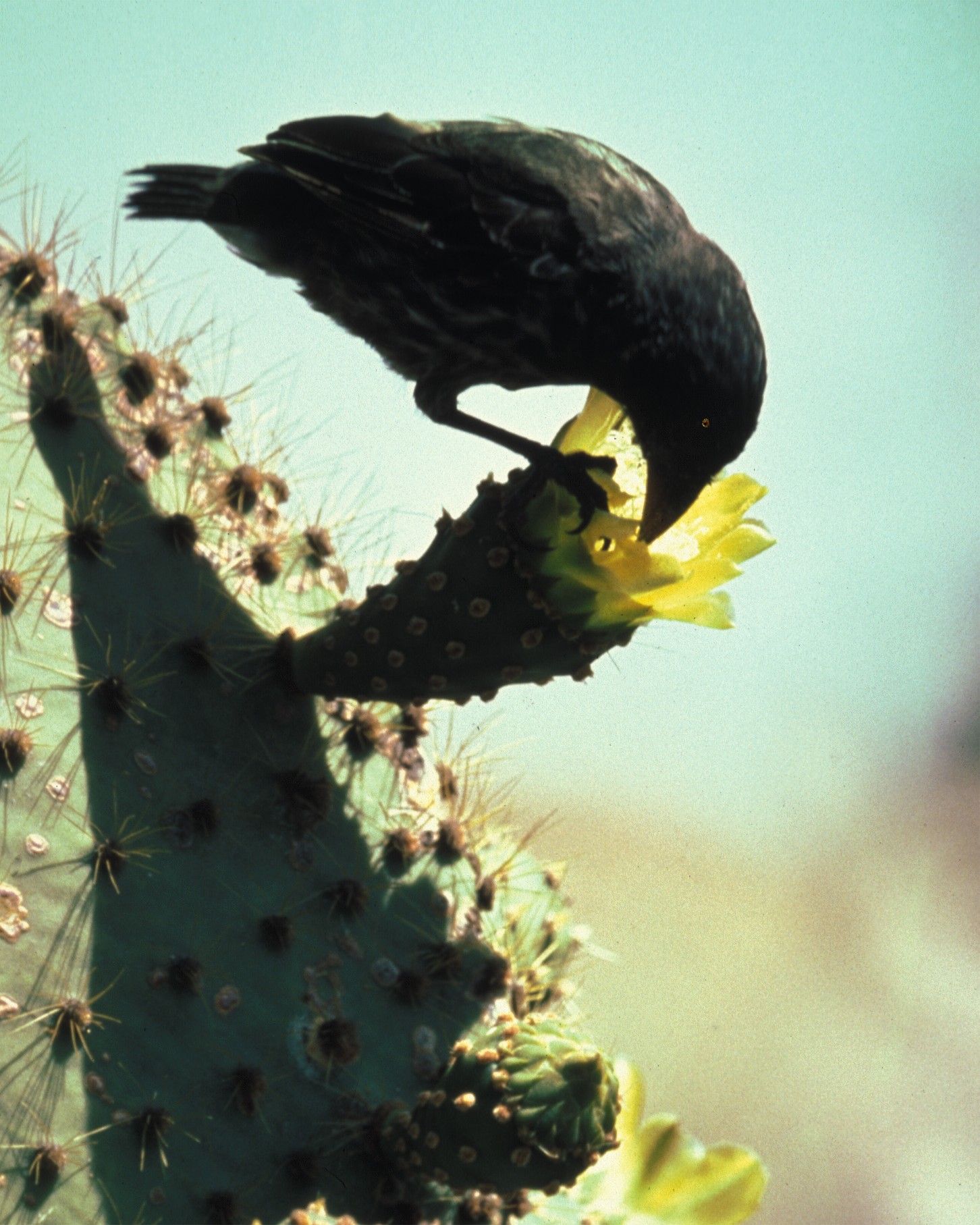

Fortunately, the Origin of Species was not to be sacrificed for a bowl of tortoise soup. Soon after returning to England, Darwin resolved these important issues when his previously mistaken field judgments were corrected by fellow naturalists. What ensued is a fascinating chapter in the human side of science, revealing a fallible but daring thinker who achieved his ultimate intellectual triumph through dogged pursuit of a heretical idea. Dr. Sulloway uses the dramatic story of Darwin and the Galapagos to illustrate the nature of creativity, genius, and how important discoveries are really made.
Illustrated with 80 color slides.
"Mom Always Like You Best! Birth Order, Family Dynamics, and World History."
Lecture Summary: Individuals raised in the same family are often no more similar in personality than those from different families. Siblings are surprisingly different because they employ differing strategies in their efforts to obtain parental resources. Variations in these strategies are determined by differences in age, size, strength, status--which correlate directly with birth order. Firstborns often serve as a surrogate parent and tend to be more closely identified with their parents than are laterborns. As a consequence, firstborns are inclined to defend the status quo, whereas laterborns tend to react against it. Together with family niches, sibling competition is a powerful engine that drives personality development and, in turn, has shaped important aspects of world history.
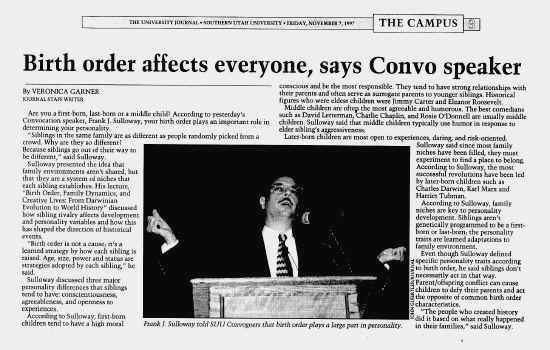
Family Businesses
Dr. Sulloway has a particular interest in family businesses and the conflicts they sometimes engender among family members (especially siblings). He has lectured widely on this subject at meetings of the Young President's Organization, the World Economic Forum (Davos, Switzerland), Harvard Business School, and numerous other organizations devoted to the study and support of family businesses. He is also engaged in research on conflict and cooperation in family businesses.
Lecture for Family Business Groups: "Is Birth Order Ruining Your Succession Plan?"
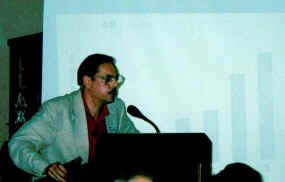 Lecture Summary: Owing to
biological evolution, conflict is built into family life.
On average, siblings share only half of their genes, so
they are inclined to keep for themselves twice as much of
any scarce resource as they give to a brother or sister.
Because parental investment is a scarce resource,
offspring typically manifest sibling rivalry.
Lecture Summary: Owing to
biological evolution, conflict is built into family life.
On average, siblings share only half of their genes, so
they are inclined to keep for themselves twice as much of
any scarce resource as they give to a brother or sister.
Because parental investment is a scarce resource,
offspring typically manifest sibling rivalry.
Fortunately, biological evolution has also predisposed family members to cooperate with one another. Close relatives tend to behave cooperatively because they share many of the same genes and thus represent genetic insurance policies for one another. In addition, unrelated individuals tend to cooperate when there are clear benefits to doing so--a process that biologists call reciprocal altruism.
To what extent do these Darwinian principles, which are well documented for animal species, apply to human beings? In particular, what can family members do to maximize cooperation, rather than competition and conflict, within the family system? This presentation explores these and other important questions in terms of recent studies about family dynamics, including new research on the kinds of problems that most threaten the survival and continuation of family businesses.
Private Consultations
In connection with his lecturing on the subject of family businesses, Dr. Sulloway offers private consultations with family members. If you have a problem concerning your family business and would like to discuss with Dr. Sulloway, you may reserve time for a private appointment.
Links to Articles on Birth Order and Its Implications for the Business World
"Are You a Business
Rebel?," by Donna Milmore, The Aubin Review,
3, no. 1 (1997). Also "Family Dynamics and Business,"
by Donna Milmore, The Aubin Review, 3, no. 2 (1997).
These two articles contain the results of a survey on
birth order and corporate behavior involving 660 C.E.O.s.
Click here to access these two articles (see the relevant titles under the menu choice "Newsletters and Published Articles").
See also Judith H. Dobrzynski, "Born to Be Wild: A Telling Birthmark for Businesses--Research Says How C.E.O.s Act is linked to Order in the Family." The New York Times, 21 February 1997, pp. B1-3; and Rita Koselka, "Born to Rebel? Or Born to Conserve?," Forbes, 10 March 1997
©2000
Frank Sulloway, Ph.D.
Site development by e2m Webtelligence